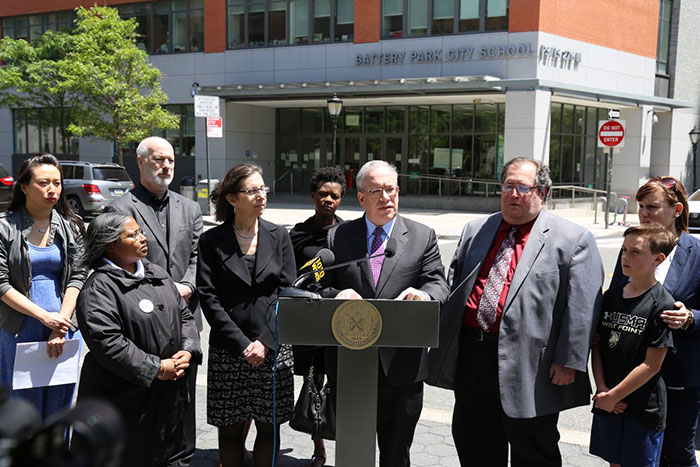Photo Courtesy of Comptroller Stringer’s Office
Stringer released his Office’s latest audit on Sunday.
By Forum Staff
The City Department of Education has spent hundreds of millions of dollars to upgrade internet connectivity in schools, but the service still doesn’t meet educators’ needs, according to an audit released on Sunday by City Comptroller Scott Stringer.
The DOE embarked on the installation of high speed internet connectivity a decade ago, according to Stringer, but it could not provide the auditors with any strategic plans, timelines, or budgets.
“This is an example of exactly what not to do. With taxpayer dollars at stake, with a complex high speed internet connectivity installation to all of the City’s middle schools, the DOE lacked even the most straightforward management systems,” Stringer said. “Our kids deserve 21st century classrooms that prepare them for a 21st century economy. But without any semblance of strategic planning or budgeting, we’ve ended up with hundreds of millions of dollars spent on service that our schools say doesn’t serve them well. The City has a responsibility to ensure efficiency with every taxpayer dollar and to maximize every resource dedicated to our children’s education. The lack of organizational discipline, quality control, and overall accountability is simply startling — and as technology advances exponentially, the DOE must do better. It has to change.”
The comptroller noted that in 2007 the DOE began upgrading internet infrastructure in schools to deliver high-speed connections of at least 10 megabits per second. The department’s Capital Plan for 2010 through 2014 included nearly $1 billion for technological enhancements, of which $347.6 million was for broadband connectivity and wireless service. The DOE, Stringer said, added $650 million to sustain high speed internet connectivity and increase internet capacity in its Capital Plan for 2015 through 2019. Auditors tested the fiber optic connections that support high speed connectivity and found them to be available to all City middle schools.
However, Stringer said that his Office found that DOE had no plans or total budgets in place during the decade-long project to upgrade schools’ technology infrastructure. Missing information included project plans, implementation timelines, progress reports, costs, dates of installation, and all the names of contractors who worked on the project.
“One major concern that I have with the internet in our school is that it is very, very slow and many times students and teachers have to abandon a video or project due to the internet not working or taking too long to open a site or streamline a video,” said a Queens school leader, according to the Comptroller’s Office.
Another borough school leader said, “There is nothing that I like about the internet service in my building. After a health checkup last year, we received an upgrade. Unfortunately, we still peak over our bandwidth throughout the entire day… We cannot accommodate or even plan a [Bring Your Own Device] policy or 1 to 1 plan because of the inferior infrastructure.”
Stringer said that his Office issued nine recommendations to the DOE, including that the department improve communication with middle school leaders, proactively partner with middle schools to review their technology needs, and maintain real oversight of future technology projects to protect from fraud, theft, waste, and abuse.

